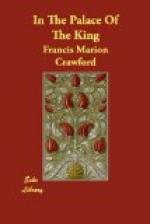But when Adonis had almost carried him to Don John’s door, and pushed him into the room, and when he saw that the man he supposed to be dying was standing upright, holding a most beautiful lady by the hand, he drew back, seeing that he had been deceived, and suspecting that he was to be asked to do something for which he had no authority. The dwarf’s long arm was behind him, however, and he could not escape.
“This is the priest of the west tower, your Highness,” said Adonis. “He is a good priest, but he is a little frightened now.”
“You need fear nothing,” said Don John kindly. “I am Don John of Austria. This lady is Dona Maria Dolores de Mendoza. Marry us without delay. We take each other for man and wife.”
“But—” the little priest hesitated—“but, your Highness—the banns—or the bishop’s license—”
“I am above banns and licenses, my good sir,” answered Don John, “and if there is anything lacking in the formalities, I take it upon myself to set all right to-morrow. I will protect you, never fear. Make haste, for I cannot wait. Begin, sir, lose no time, and take my word for the right of what you do.”
“The witnesses of this,” faltered the old man, seeing that he must yield, but doubtful still.
“This lady is Dona Inez de Mendoza,” said Don John, “and this is Miguel de Antona, the court jester. They are sufficient.”
So it chanced that the witnesses of Don John of Austria’s secret marriage were a blind girl and the King’s fool.
The aged priest cleared his throat and began to say the words in Latin, and Don John and Dolores held their clasped hands before him, not knowing what else to do, and each looked into the other’s eyes and saw there the whole world that had any meaning for them, while the priest said things they but half understood, but that made the world’s difference to them, then and afterwards.




